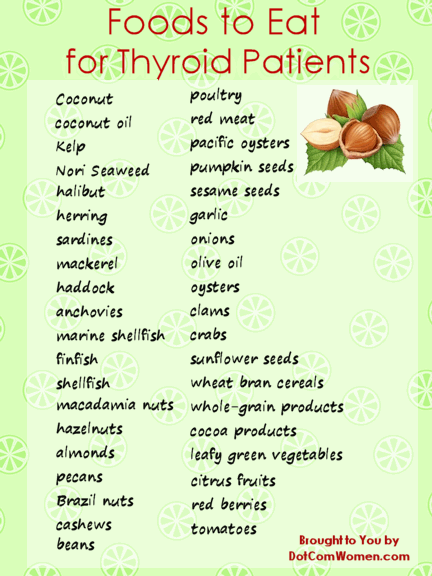
The thyroid sounds like it should be related to the thigh, particularly when people mention it when talking about weight gain. Actually, it’s a butterfly shaped gland that rests in the bottom of our throats. Different thyroid conditions relate to differing nutritional and medical approaches. A regularly-functioning thyroid gland’s job is to control the secretion of hormones into the body. As such, it is a hormonal issue that results in either an under or overactive thyroid gland. Essentially, the gland governs metabolism, so there are certain foods which can aggravate it, and others which contain rich elements necessary to combat problems.
Some type of thyroid disease is relatively common today; affecting one in 20 people. Generally more women display symptoms of thyroid problems, which include fatigue, depression and mood swings, weight gain or loss, insomnia, dry skin and thinning hair.
Contents
Hyperthyroidism
An overactive thyroid is also called hyperthyroidism. It means too much of the thyroid hormone has been released into the body and can result in unwanted weight loss, rapid heartbeat and sensitivity to high temperatures. Less common, hyperthyroidism affects about 1% of women and is usually present due to overproduction of hormones, stemming from benign tumours in the thyroid area; or autoimmunity causing the hormone production to go into overdrive. Smoking can exacerbate the onset of this type of autoimmune issue.
Hypothyroidism
So, an underactive thyroid, then, does not release enough and can therefore be associated with weight gain, extreme fatigue and inability to cope with the cold.
What Causes Hypothyroidism?
There is an extensive list of causes for hypothyroidism; the cells in the thyroid gland can’t make enough thyroid hormone. These include autoimmune diseases, removal of thyroid glands, radiation treatments, congenital hypothyroidism, thyroiditis, medicines, iodine consumption irregularity, and many more.
Most commonly, the immune system we have built in to protect the body from invasive infections can mistake thyroid gland cells and their enzymes for threats, and as a result can attack them.
Some people experience a combination of both under and overactive thyroid functions, which means they may experience weight fluctuations, temperature fluctuations and mood swings. Many physicians do not detect thyroid problems, since they have been trained to perform a urine test. This only generally shows up in extreme cases, whereas people should really be diagnosed via symptoms.
The Thyroid and Metabolism
Produces and secreting T3 and T4, two hormones that control how quickly your body uses energy and oxygen – the thyroid is closely linked to how fast your body burns calories. When you produce less of these hormones, your metabolism will slow down and you may gain weight. If the thyroid either stops entirely, or is removed many people find they gain weight and have ti try different drugs to try and balance the hormones.
Iodine and the seas
Thyroid conditions are linked to the iodine consumption a person may ingest. Since our seas actually contain the majority of the world’s iodine, there are some foods that come from the sea, which can be excellent in balancing the complicated hormones and reducing symptoms of the condition. A mineral which is essential to healthy thyroid glands, iodine is present in all sea fish and sea vegetables such as seaweed.
Although seafood, fish and even fish-eating animals can be good sources of iodine, the star of the nutritional moment, seaweed concentrates it, due to its extreme efficiency at absorbing nutrients in its tempestuous conditions. Kelp, for example has 100,000 times more iodine than the surrounding waters. As I often remind you, seaweed is also packed full of essential nutrients including iron, magnesium, calcium, phosphorus, selenium, and manganese.
Of course, if you have an overactive thyroid, then you may need to cut down on iodine, which would mean eating more oily fish, and less sea fish.
Burning calories
For those with an underactive thyroid, you can help to give your metabolism a natural boost by burning calories through physical activity. Just 20 minutes a day of moderate exercise will help you to burn calories, which help metabolise fat. A word of warning is to exercise caution when you exercise, since burning too many calories will also slow down the metabolism. Our bodies are pretty incredible and as such they have a built-in survival mechanism that slows down the metabolism to conserve energy if you haven’t eaten enough. This is why yo-yo dieting can actually be really bad for you. Everyone should consume at least 1,200 calories a day.
Food guidelines
It’s recommended that the majority of the dietary intake for people with thyroid conditions should be between 45 and 65 percent complex carbohydrates. These include things like squash, vegetables and most legumes. Also around 15 to 35 percent of your diet needs to come from lean protein, like fish and chicken and eggs. Between 25 and 35 percent should derive from the healthier fats such as avocadoes, oily fish and nuts. Sugar, refined carbs and many cooking oils should be avoided, as well as all sugary drinks and processed food.
Aggravators

Unfortunately some foods, like the cruciferous vegetables and soy products can aggravate and thus exacerbate thyroid conditions. This is due to their goitrogenic compound content. Put simply, these are chemicals that interfere with thyroid hormones. A common symptom of thyroid problems is a goiter, which means there is a protrusion in the neck caused by swelling or enlargement of the thyroid. When a thyroid gland is functional, naturally it tries to grow more cells to maintain hormone levels. This can result in an uncomfortable goiter.
The damage caused by goitrogenic food, such as broccoli can be reversed, or reduced by heat. As such, eating raw broccoli, cabbages and other such root veg raw can lead to aggravation, but as soon as these vegetables are cooked, the toxicity is reduced and will not cause a problem.
Soy products are popular for vegetarians and vegans, and most people these days. Those ingesting a high intake of soy products may find their thyroid issues being exacerbated, and as should try replacing soy milk with coconut. The good news is that soy becomes less goitergenic when it’s been fermented, so products like natto, miso and tempeh are all safer to eat.
Soothers

Whilst some foods can increase impact of thyroid issues, so there are plenty which help to combat the issues experienced. Already above, we touched upon the incredible power of seaweed as a reliever of thyroid symptoms. This is due to its iodine quotient primarily, but also because it can be rich in selenium. This is a mineral which helps the body to naturally convert thyroxine into thyronine, which balances the hormonal equilibrium.
Other foods containing selenium include nuts, especially Brazils and oily fish such as salmon and mackerel, as well as cold pressed nut oils and health foods such as chia seeds, linseeds and many others.
Cod is a particularly good source of protein for people with thyroid problems, since it is rich in both selenium and iodine and contains omega-3s and essential fatty acids.
Spirulina is a popular health supplement available online and through health stores. It is essentially a blue-green algae which is rich in minerals. Like its cousin seaweed, spirulina is high in calcium, iron, magnesium, potassium and zinc.
As is the case with any new diet plan or health overhaul, it is best to seek the advice of your physician, and this article is written as a guide to optimizing health.
